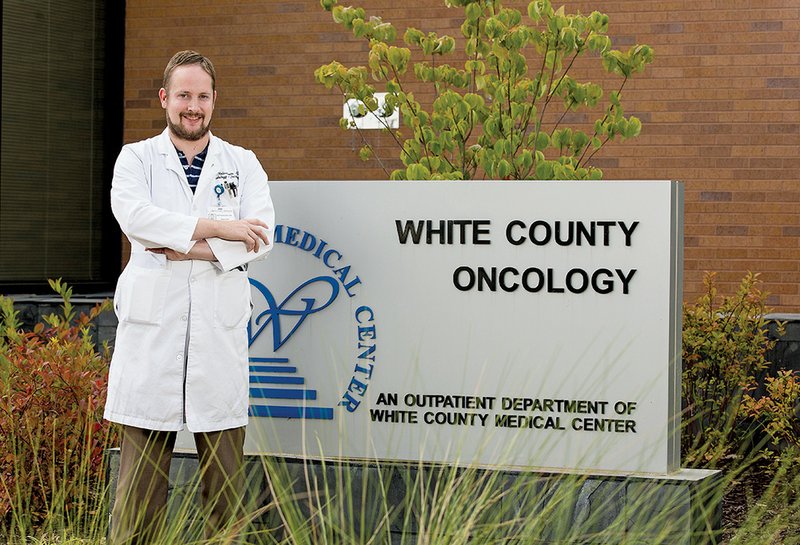Dr. Whit Robertson, a medical oncologist at White County Medical Center in Searcy, didn’t begin medical school with the intention of becoming a doctor who specializes in cancer.
His father, Bill, is a urologist in Searcy, and has been in the area since 1998.
He exposed his son to the career of medicine at a young age, and although he told his son to pursue the career he wanted to, Robertson decided to go to medical school.
Robertson subsequently moved to Arkansas when he enrolled in medical school at the University of Arkansas for Medical Sciences in Little Rock to pursue his dream of becoming an allergist.
An unexpected event while he was in medical school caused Robertson’s dream of becoming an allergist to be put on hold.
Robertson had headaches sometimes, but he didn’t realize his world would be turned topsy-turvy while he was still a med student.
“My third year of medical school, I found out I had a brain tumor,” Robertson said. “I had a seizure while I was on my general-surgery rotation.”
Robertson said he was putting EKG leads on a patient in February 2004 when he had a seizure and fell on the patient’s bed.
“I took a year off of medical school,” he said.
At just 24 years old, Robertson was diagnosed with oligodendroglioma, a slow-growing brain tumor that usually occurs in young adults, according to the Cedars-Sinai website.
Though he had some headaches that could have been symptoms of his tumor before his seizure, Robertson said, something catastrophic, like a seizure, helps doctors diagnose oligodendroglioma.
“You just have uncertainty of what to do with the time you have left,” Robertson said. “You ask yourself, ‘Who’s going to raise my family?’”
Robertson said he realized all of the things he wanted to do in life and hadn’t had the chance to pursue.
“It makes you rethink life at 24,” Robertson said.
He chose to move back in with his parents in Searcy during his year off from medical school while he was undergoing treatment for his tumor.
“I had surgery, and then six weeks of chemotherapy with radiation,” Robertson said. “After that, I had one year of chemo.”
During his year off, he didn’t want to get out of the groove of being a student, so Robertson said he audited classes at Harding University in Searcy.
“While I was doing that, I met my wife,” he said.
Though cancer can cause both physical and emotional stress for a patient, Robertson’s bout with his brain tumor gave him an opportunity.
Cancer opened Robertson’s eyes, and he changed the focus of his medical training from allergies and immunology to oncology.
“[Through having cancer], I can relate to my patients,” he said. “I wouldn’t have gone into [oncology] if it wouldn’t have been for my cancer.”
After he graduated from UAMS, he completed a fellowship in hematology/oncology and a fellowship in hospice and palliative medicine at the medical school in Little Rock.
With 11 years of medical training under his lab coat, Robertson completed school on June 30 and began his career Aug. 1 at White County Medical Center.
He holds board certifications from the American Board of Internal Medicine and from the American Board of Hospice and Palliative Medicine, and is a member of the American Society of Clinical Oncology and the American Society of Hematology.
“I enjoy the people more than anything else,” he said. “A lot of times, [my patients] are told the worst.”
Most of the time, Robertson said, his patients assume the worst when they get a cancer diagnosis.
“There’s always something we can do to help,” he said.
Robertson said he does what he can to show patients they can be optimistic.
“We make long-term and short-term goals,” he said. “I can also tell them what their treatment will be like.”
He shares his story of surviving cancer with his
patients, and that gives them hope.
“Whatever happens, we’re going to take care of them, no matter what,” he said.
He works along with two other medical oncologists in the White County Medical Center Cancer Center of Excellence.
One of the doctors he works with daily was Robertson’s doctor while he was undergoing treatment for cancer.
“I’m going to learn from [my fellow doctors],” Robertson said.
He said his co-workers have experience in the field, and that experience will help him learn each day at work.
He’s still new to the Searcy facility where he works and is still getting used to some aspects of being a full-time doctor.
“I’m not used to having my own nurse,” he said.
When he’s not working, Robertson said, he enjoys spending time with his wife and children. In addition to family time, Robertson has found an interest in Christian apologetics.
“It’s making a defense of your faith,” Robertson said.
Robertson said interaction with the people of Searcy and his patients is what brings him back to work each day.
“[Having cancer] is not as hopeless as a lot of people think,” he said.
He looks forward to his future in the field of oncology in Searcy.
Staff writer Lisa Burnett can be reached at (501) 244-4307 or lburnett@arkansasonline.com.
